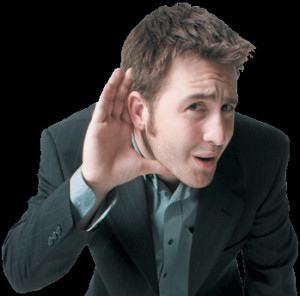 When we talk about good communication we naturally assume that everyone is 100%, with all their working parts in good order, when there are no external signs of impairment. But the reality is that many people are not in tiptop shape, no longer at full ability, and have physical issues that hinder their ability to communicate as well as they would like.
When we talk about good communication we naturally assume that everyone is 100%, with all their working parts in good order, when there are no external signs of impairment. But the reality is that many people are not in tiptop shape, no longer at full ability, and have physical issues that hinder their ability to communicate as well as they would like.
One such limitation is hearing, or more accurately loss of hearing. Not only the elderly but many others have some degree of hearing loss due to accident, injury, and environmental conditions. Of real concern is today’s youth with loud music emanating from deeply embedded ear buds. When you can hear the beat of the music on the outside, the decibel level inside the ear canal has to be damagingly loud. This is a future problem to be dealt with on a massive scale.
Todays hard of hearing population is largely the elderly, with more and more baby boomers (the largest generation) reaching the elderly ranks every year. When my mother-in-law was in her 70s she was a poster child for elderly vanity – growing deaf from years of mill work, but refusing to wear a hearing aid because it “made her look old”. I gently pointed out that no one would think badly about a 75-year-old woman with a hearing aid, but she would have none of it. Instead she would rather sacrifice her quality of life, missing large chunks of the conversation happening around her. I can’t imagine that vanity was worth the trade-off, but apparently she thought it was.
Another issue with people who are hard of hearing and also vain is they don’t always admit that their hearing is going. My mother-in-law would nod which signaled tactic understanding, but that wasn’t the case at all. She was loath to speak up and ask you to repeat several times, so she just gave up trying to understand. But without saying something, and not reading confusion on her face, she just went along with the ‘conversation’. When the other person has no way of knowing that they are not heard and therefore not understood, it really is a one-sided exchange.
So how does one communicate with the hard of hearing? The tendency is to shout but that’s not helpful if in shouting the voice pitch rises. A good idea is to drop the pitch of your voice as low as you can, as the higher tones are the first to go when hearing declines. Another help is to talk slowly and enunciate clearly with your lips while being sure to face the person, since many who are hard of hearing have become good lip readers.
Developing the trait of patience is always appreciated by the hard of hearing, which is not always easy to do. Instead we often grow impatient with their disability, which is not their fault, and start treating the elderly among us like children. The disrespectful way we treat our elderly in America is another topic entirely. But for this discussion, communicating with the elderly, hard of hearing or not, in a respectful, perhaps loud, manner shows wonderful character.
Perhaps you recall the ‘mosquito buzz’ rage a few years back, when teenagers learned that adults couldn’t hear certain tones at certain ages. So to avoid getting caught receiving a text or a call in class, students would set their cell phone ring tone to one of these high pitches which they knew their teacher would not be able to hear. This same concept was turned against them when malls (not the US) would annoyingly pulse the same high (17 kHz) tone from speakers to harmlessly repel teens from loitering, without notice by adult shoppers over the age of 20.
If you want to test your hearing ability for this tone and other frequency tones (below 50 years, below 40 years, and below 24 years) – here’s a link to a You Tube video to test your over 20-year-old hearing loss: http://www.youtube.com/watch?v=IrewnzQYrPI
COMMUNICATION TAKEAWAY: Hearing is a big part of communication, so impaired hearing can have a huge detrimental impact. While the responsibility is largely on the impaired person to get help, that may not be fully possible to restore hearing back to the original pristine state. Paying attention to body language conveyed in facial expression is important to facilitate full understanding.
